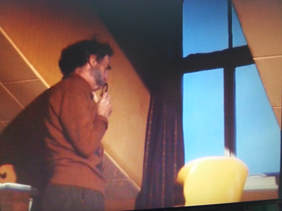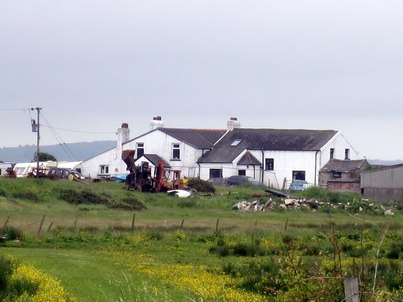August 2017
dub, n.
by BRIAN WHALLEY

Brian Whalley is Visiting Professor at the Department of Geography at the University of Sheffield. He spent most of his career as Professor of Geomorphology at Queen’s University of Belfast, with visiting positions at the University of Iceland and Arizona State University. He continues to research in glacial systems, mountain geomorphology and in the educational uses of technology. An enthusiastic member of the Norman Nicholson Society, Brian gave a talk on Nicholson and Geology at an event organised by the Royal Geographical Society at Brantwood, John Ruskin's former home near Coniston, in September 2016.
Dub (n.) Northern British dialect a pool of water, puddle. C16 Scottish dialect dubbe related to Middle Low German dobbe (Collins English Dictionary), similarly in Merriam-Webster but not included in the Concise Oxford)
prob. Scand, akin to Norw dobbe, swampy land, MDu doppe, shell, MLowG dobbe, pool (Harper Collins)
cf irish dobhar = water or welsh dŵr = water as in Dŵr Cymru
(In Irish and Gaelic, dubh = black although pronounced 'doo' rather than 'dub' and might be related, although Dublin = Dubh linn, i.e. black pool.)
I have not found a poem by any other English poet with the word ‘dub’ in it other than in three of Norman Nicholson's: ‘Rock Face’, ‘Beck’ and ‘Frost Flowers’. We'll look at each in turn.
Rock Face (CP 47, 1948)
Tufted in ear and nostril, and an ooze
Like drip from marble mouth that spews
Into the carved trough of a city fountain.
Now the rock is blasted, and the dub
Chock-full of soil and rubble, and the shale
Carried away in cart and lorry,
Yet still like cracked reflections in a pool,
Or image broken in a smithereen of mirrors,
The meaning and implication of the word here is relatively simple; ‘puddle’ or ‘pool’ fit the meaning well enough. Here it does help the reader’s understanding to know what Nicholson means by ‘dub’, as opposed to ‘pool’, in a subsequent line. The word has clearly been chosen primarily for its local associations and because Nicholson consciously wished to draw on Cumbrian dialect vocabulary, without actually writing dialect poems.
In Beck (CP 319), we have:
The pith of the pikes
Oozes to the marshes,
Slides along the sykes,
Trickles through ditch and dub,
Enters the endless
Chain of water,
As a geomorphologist I think this is one of my favourite lines in Nicholson. Not just the passing of water down from the pikes to lowland in the hydrological cycle (chain of water), but also the passing of elements of the land and of the rock itself: the ‘pith of the pikes’. In this context ‘ditch’ and ‘dub’ make perfect sense. ‘Syke’ we have met before as WotM (July 2015). But in addition, the rhymes, assonance and repetition come together; holistic – dazzling!
Finally, in Frost Flowers (CP 126, ) ‘dub’ comes into a poem composed of simple rhyming couplets.
But from my freestone window-sill
Summer flowers are sprouting still:
Seaholly, thistle, blackthorn, whin,
Juniper, butcher's broom and pine,
Herb and conifer and shrub
Sprung in the night from a red dub,
All stemmed and sapped with the cold ice,
And hung with webs of broken glass,
prob. Scand, akin to Norw dobbe, swampy land, MDu doppe, shell, MLowG dobbe, pool (Harper Collins)
cf irish dobhar = water or welsh dŵr = water as in Dŵr Cymru
(In Irish and Gaelic, dubh = black although pronounced 'doo' rather than 'dub' and might be related, although Dublin = Dubh linn, i.e. black pool.)
I have not found a poem by any other English poet with the word ‘dub’ in it other than in three of Norman Nicholson's: ‘Rock Face’, ‘Beck’ and ‘Frost Flowers’. We'll look at each in turn.
Rock Face (CP 47, 1948)
Tufted in ear and nostril, and an ooze
Like drip from marble mouth that spews
Into the carved trough of a city fountain.
Now the rock is blasted, and the dub
Chock-full of soil and rubble, and the shale
Carried away in cart and lorry,
Yet still like cracked reflections in a pool,
Or image broken in a smithereen of mirrors,
The meaning and implication of the word here is relatively simple; ‘puddle’ or ‘pool’ fit the meaning well enough. Here it does help the reader’s understanding to know what Nicholson means by ‘dub’, as opposed to ‘pool’, in a subsequent line. The word has clearly been chosen primarily for its local associations and because Nicholson consciously wished to draw on Cumbrian dialect vocabulary, without actually writing dialect poems.
In Beck (CP 319), we have:
The pith of the pikes
Oozes to the marshes,
Slides along the sykes,
Trickles through ditch and dub,
Enters the endless
Chain of water,
As a geomorphologist I think this is one of my favourite lines in Nicholson. Not just the passing of water down from the pikes to lowland in the hydrological cycle (chain of water), but also the passing of elements of the land and of the rock itself: the ‘pith of the pikes’. In this context ‘ditch’ and ‘dub’ make perfect sense. ‘Syke’ we have met before as WotM (July 2015). But in addition, the rhymes, assonance and repetition come together; holistic – dazzling!
Finally, in Frost Flowers (CP 126, ) ‘dub’ comes into a poem composed of simple rhyming couplets.
But from my freestone window-sill
Summer flowers are sprouting still:
Seaholly, thistle, blackthorn, whin,
Juniper, butcher's broom and pine,
Herb and conifer and shrub
Sprung in the night from a red dub,
All stemmed and sapped with the cold ice,
And hung with webs of broken glass,
But why ‘red dub’? And especially if there is any association in the etymology with dubh = black? From the 21st century looking back to 1948 the significant word is red rather than dub = black. It surely relates to the red dust in the air at the time. This is explained at some length in WotM Haematite (April 2017).
As well as in the poems, we have Stoup Dub, a farm ten minutes walk from Haverigg and Black Dub a damp, no pool but certainly swampy, area a little further to the west both on OS 25 000 map. If we explore a little more in toponymy we have Black Dub stream (near Orton) and its monument to Charles II coming from Scotland at New Year in 1651. Tarns Dub is a small, almost circular tarn near Holm St Cuthbert (NE of Allonby). Black Dub stream flows west to the coast with Dubmill point and Scar just to the north of its mouth. Three Dub Tarn is a single tarn in the low hills 2km west of Windermere.
So, three dubs in Nicholson poems and two places near Haverigg give you as many as in the rest of Cumbria. There is a Wash Dub Wood 4km SW of Burton in Kendal, so it is almost in Cumbria; and a Wark Dub between Kelso and Coldstream. Any more?
Brian Whalley
I thank Antoinette Fawcett for comments and additions to a draft of this note
So, three dubs in Nicholson poems and two places near Haverigg give you as many as in the rest of Cumbria. There is a Wash Dub Wood 4km SW of Burton in Kendal, so it is almost in Cumbria; and a Wark Dub between Kelso and Coldstream. Any more?
Brian Whalley
I thank Antoinette Fawcett for comments and additions to a draft of this note


